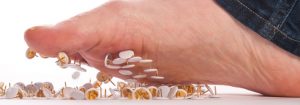
While about 60% of patients who suffer from diabetes also develop peripheral neuropathy, a nerve condition that causes tingling, numbing and tickling in the extremities In addition to pain and numbness, the condition can include a variety of other symptoms such as prickling and throbbing or a freezing sensation. In addition, it can also damage the brain’s capacity to communicate properly with regions of the body.
While chiropractic care is not a ‘cure’ for peripheral neuropathy, it is an important part of an effective treatment program
Treatment programs that cover up the symptoms are ignoring the bigger problem. Dr Allie follows a ‘whole body’ approach to treatment, which means we start by addressing the underlying trigger for a patient’s pain; a diagnostic exam is conducted in order to identify the cause of the pain and understand which specialty of care is needed in addition to chiropractic care.
Early diagnosis and treatment may reduce the severity of the motor nerve and sensory nerve damage, as well as help patients with the management of the disease. The pain symptoms associated with peripheral neuropathy indicate poor health conditions and need to be evaluated carefully.
Peripheral neuropathy is a condition often associated with diabetes, despite the fact it can also be caused by autoimmune disorders, tumors, nutritional imbalances or infections, and it can even be hereditary. The nerve disorder currently affects about 20 million people in the United States, according to the National Institute of Neurological Disorders and Stroke, and while the symptoms may seem unimportant, early diagnosis may prevent further complications.
Everyone experiences peripheral neuropathy a little differently. For some individuals, the pain may come and go, while for others, the pain may be constant. As the condition worsens, individuals may experience coordination and balance loss, along with a freezing pain, muscle weakness or extreme sensitivity to touch. We urge anyone who may be experiencing these symptoms to seek treatment.
